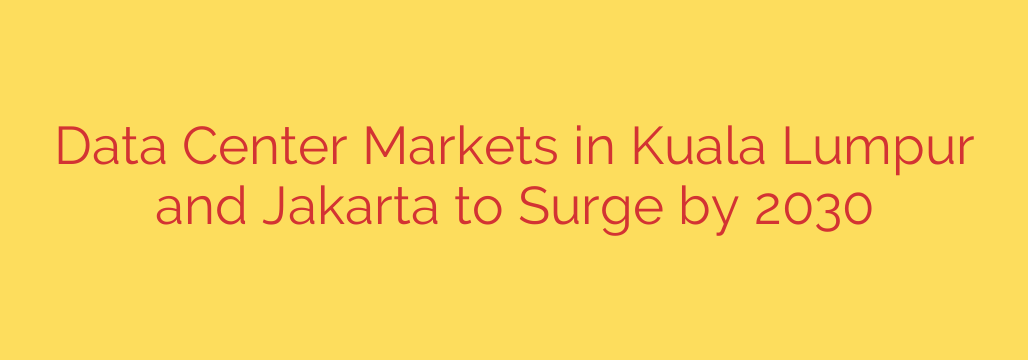
Southeast Asia’s Digital Titans: Why Kuala Lumpur and Jakarta are Poised for Explosive Data Center Growth
The digital landscape of Southeast Asia is undergoing a monumental transformation, and at the heart of this revolution are two key cities: Kuala Lumpur and Jakarta. Once considered emerging markets, they are now rapidly ascending to become major data center hubs, with projections indicating a massive surge in capacity and investment by 2030.
This growth isn’t just a trend; it’s a fundamental shift driven by a perfect storm of economic, technological, and demographic factors. As businesses and consumers across the region embrace digitalization, the demand for robust, scalable, and local data infrastructure has reached a critical tipping point.
The Core Drivers Fueling the Data Center Boom
Several powerful forces are converging to propel the data center markets in both Malaysia and Indonesia. Understanding these drivers is key to grasping the scale of the opportunity.
- Hyperscaler Expansion: Global cloud giants like Amazon Web Services (AWS), Google Cloud, and Microsoft Azure are aggressively expanding their footprint in the region. They are investing billions to build local cloud regions to reduce latency, comply with data sovereignty regulations, and better serve a massive, growing customer base. This hyperscaler demand is the single biggest catalyst for new data center construction.
- Rapid Digital Transformation: Businesses of all sizes are migrating to the cloud. From banking and finance to retail and manufacturing, companies are shedding legacy on-premise infrastructure in favor of more agile, cost-effective cloud solutions. This migration requires enormous amounts of data center capacity.
- A Booming Digital Economy: With one of the world’s youngest and most digitally-native populations, Southeast Asia is a hotbed for e-commerce, digital payments, streaming media, and online gaming. Indonesia alone represents a colossal market, and its continued digital consumption fuels an insatiable need for data processing and storage.
- Supportive Government Initiatives: Governments in both Malaysia and Indonesia have launched ambitious national digitalization plans. Initiatives like Malaysia’s “MyDIGITAL” blueprint are specifically designed to attract digital investments, foster innovation, and build a world-class infrastructure, creating a highly favorable environment for data center operators.
Kuala Lumpur: A Strategic Gateway to Asia
Kuala Lumpur is strategically positioning itself as a stable and well-connected hub for digital infrastructure. The Greater Kuala Lumpur area, including Cyberjaya, is attracting significant investment due to several key advantages:
- Strong Connectivity and Infrastructure: Malaysia boasts robust international submarine cable connectivity and a reliable power grid, which are fundamental requirements for data center operations.
- Government Support and Incentives: The Malaysian government has been proactive in offering tax incentives and streamlined processes for data center investors, signaling a strong commitment to growing the sector.
- A Stable and Cost-Effective Market: Compared to more established regional hubs like Singapore, Kuala Lumpur offers a more affordable and scalable environment for land and operational costs, making it an attractive alternative for new builds. This cost-competitiveness is a major draw for large-scale developments.
Jakarta: Tapping into a Digital Behemoth
As the capital of Southeast Asia’s largest economy, Jakarta is at the epicenter of a massive digital awakening. The demand for data centers here is driven by sheer scale and a rapidly evolving consumer market.
- Massive Population and Internet Penetration: Indonesia has over 200 million internet users, a number that continues to grow. This massive domestic market creates a powerful “data gravity” effect, where it becomes essential to host data locally to ensure the best possible user experience.
- The Rise of Local Tech Giants: Indonesia is home to a vibrant startup ecosystem, with “unicorn” companies in e-commerce, ride-hailing, and fintech generating enormous amounts of data that needs to be processed and stored locally.
- Data Sovereignty Regulations: Like many countries, Indonesia is implementing regulations that often require certain types of data, particularly financial and personal information, to be stored within its borders. This regulatory landscape makes in-country data centers a necessity, not a choice, for many global companies.
Actionable Security and Strategy Tips for Businesses
As these markets mature, businesses looking to leverage this growth must prioritize security and strategic planning.
- Prioritize Local Compliance: When choosing a data center or cloud provider in Kuala Lumpur or Jakarta, ensure they have a deep understanding of local data sovereignty and privacy laws. Non-compliance can lead to significant penalties.
- Focus on Physical and Network Security: Demand transparency on the physical security measures of any data center facility. Furthermore, as you connect to these new cloud regions, implement a robust zero-trust network architecture to protect your data both in transit and at rest.
- Plan for Scalability: The demand in these regions is growing exponentially. Choose partners and build an infrastructure strategy that can scale with your business needs without requiring a costly and disruptive overhaul down the line.
The trajectory is clear: Kuala Lumpur and Jakarta are no longer just participating in the digital economy—they are set to become two of its most critical pillars in the Asia-Pacific region. For businesses, investors, and technology providers, the time to engage with these dynamic markets is now.
Source: https://datacenternews.asia/story/kuala-lumpur-jakarta-data-centre-markets-to-surge-by-2030








